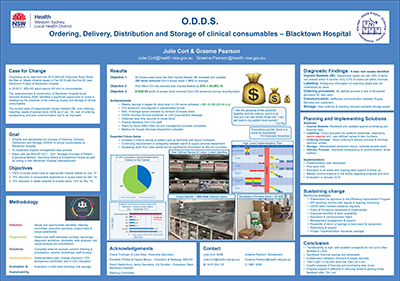The Ordering, Delivery, Distribution and Storage (ODDS) project at Blacktown Hospital aims to improve the effectiveness and efficiency of consumable stock management practice; this includes imprest and non-stock items.
View a poster from the Centre for Healthcare Redesign graduation, December 2018.
Aim
The goal of this project is to simplify and standardise the process for ODDS of clinical consumables at Blacktown Hospital by:
- ensuring 100% of in scope clinical areas have a defined, appropriate imprest basket list and min/max level for their consumables by 31 July 2018
- achieving a 10% ($125,504) reduction in expenditure on clinical consumables in scope areas by 31 December 2018
- a 10% reduction in waste, in terms of expired and unused clinical stock by 31 December 2018.
Benefits
- Reduced overall expenditure and waste resulting from expired and unused clinical stock.
- Reduced time managing and locating stock, thereby freeing up more time for patient care.
- Improved organisation, visibility, cleanliness and accessibility of stock, supports the provision of more efficient and better quality patient care.
- Reduced oversupply of clinical consumables.
Background
During the 2016-17 financial year, Western Sydney Local Health District (WSLHD) spent approximately $314 million dollars on consumables. In the current financial climate, healthcare employees are continually looking for ways to increase resource efficiency and cut costs without impacting patient care.
With the redevelopment of Blacktown Hospital due to be completed by June 2019, the project team identified an opportunity to review and redevelop how healthcare services are planned, coordinated and delivered across the WSLHD .
This project specifically addresses the WSLHD 2017-2021 strategic priority areas of patient experience matters, spending wisely and exceptional people.1
Implementation
The project aims to foster a culture of just in time instead of just in case, by having the right stock in the right amount in the right place. This will support the delivery of safe and timely patient care, eliminate waste in the form of over expenditure and expired stock, and build a collegial approach to stock management between departments.
Five main solutions have been developed.
- Imprest baskets – These have been reviewed against purchasing data from the previous 12 months and items were either updated, removed or added to meet the requirements of the department.
- Labelling – This is being improved by colour coding label holders and grouping stock into nine categories e.g. respiratory, wound care. User defined descriptions in larger lettering and product item numbers to assist the decanting of products into the correct location have also been added.
- Storage – Excess stock has been removed and the storeroom reconfigured to fit with the new imprest. Required but rarely used stock has been transferred to the Standby Store, reducing the need for multiple areas to carry the same rarely required items. The new storeroom layout will be standardised across locations.
- Stock and non-stock ordering process – A store person will be allocated to manage the imprest stock lifecycle from ordering to storage.
- Delivery and Unpacking – This will now be managed by the store person, freeing up staff to spend more time providing care for patients.
Project status
Implementation – The initiative is ready for implementation, is currently being implemented, piloted or tested.
Key dates
1 February to 21 December 2018
Implementation sites
The project will be implemented in the following clinical areas within Blacktown Hospital
- Ward C53 – Geriatrics (pilot)
- A71 – Aged care
- A71 – Oncology
- B45 – Surgical ward
- Intensive care unit
- Emergency department
Partnerships
- Agency for Clinical Innovation, Centre for Healthcare Redesign
- Innovation and Redesign Department, WSLHD
- Expansion Team, Blacktown Hospital, WSLHD
Evaluation
- An evaluation will take place once the pilot ward implementation is complete.
- Cost of stock removed from the pilot ward.
- The amount of stock relocated to other areas, or moved into the standby store.
- Post-implementation staff surveys will be compared to pre-implementation surveys to measure satisfaction, ease of access, and time taken to locate stock.
- A comparison of purchasing data pre- and post-implementation.
- Interviews with store persons to assess their view of the new process – do they find it easier, quicker, and more fulfilling?
- Monthly visual audits to assess if the implementation process change has been sustained.
- The number of items removed from scope areas imprest baskets.
Lessons learnt
- The importance of engaged and supportive Executive Sponsors cannot be underestimated.
- Early and persistent engagement of stakeholders is vital.
- Regular information sessions in the scope areas.
- Ongoing and consistent support to the scope areas during the implementation is required to reduce anxiety.
- Openly discussing resistance as it occurs can turn a resistant person into a change champion.
References
- Western Sydney Local Health District. Strategic Priorities. WSLHD.
Contacts
Julie Cort
Project Manager
Ward 2B Nursing Unit Manager,
Mount Druitt Hospital
Western Sydney Local Health District
Phone: 0419 304 153
Julie.Cort@health.nsw.gov.au
Graeme Pearson
Project Team Member
Storeperson
Blacktown Hospital
Western Sydney Local Health District
Phone: 02 9881 8299
Graeme.Pearson@health.nsw.gov.au
